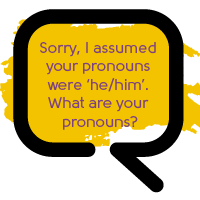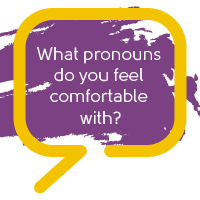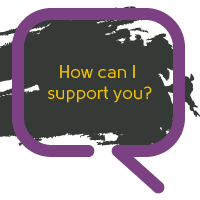What are pronouns?
A 'pronoun' is a word used to refer to a person, such as 'he', 'she' or 'they'. This relates to an individual’s gender identity - not the sex they were assigned at birth.
What is gender identity?
'Gender identity' is an individual’s inner sense of being man, woman, feminine, masculine, neither, both or moving freely between and outside of the gender binary.
A person’s genitals, name, physical body or gender expression (for example, how someone dresses, styles their hair or what make up they choose to wear) is not always related to their pronouns or their gender identity.
You cannot tell if a person is transgender or gender diverse just by looking at them, so try not to make assumptions.
Pronouns and gender
In our society, we use gendered and gender-neutral pronouns:
- 'She', 'her' and 'hers' are gendered pronouns typically used by female-identifying people
- 'He', 'him' and 'his' are gendered pronouns typically used by male-identifying people
- 'They', 'them' and 'theirs' are commonly used gender-neutral pronouns that don’t imply someone identifies as male or female.
The gender diverse and non-binary community will typically use gender neutral pronouns, however, some individuals may use gendered pronouns – so it is always best to check in and ask.
 Misgendering
Misgendering
'Misgendering' is a term that describes the accidental or intentional use of incorrect pronouns towards a person. If you use the incorrect pronouns accidentally, it can feel a bit awkward - but acknowledging your mistake or correcting yourself verbally
is a simple and easy way to move forward and let a person know you are conscious of your slip up. Acknowledging your mistake will also let a person know that you are genuinely trying to use the correct pronouns, and that you respect their gender identity.
Misgendering someone intentionally can create negative impacts on the wellbeing and self-worth of a trans or gender diverse person, so it is important to educate yourself as to what pronouns are and why they are important, and what an individual’s personal pronouns are.
Asking someone what their pronouns are
 There
is no one correct way to ask someone their pronouns, and asking in a safe and respectful way depends on the situation, your relationship with the person, who else is around when you ask, and the place you ask.
There
is no one correct way to ask someone their pronouns, and asking in a safe and respectful way depends on the situation, your relationship with the person, who else is around when you ask, and the place you ask.
If you are unsure of someone’s pronouns, there are a few things to consider before asking them:
- Is the space safe for people who are trans or gender diverse?
If you ask a person their pronouns, are they in a safe environment to answer freely without repercussion or discrimination. - Are people in your workplace educated on trans and gender diverse issues?
Understand that if a trans or gender diverse person answers your question openly they may not always have the energy to educate everyone in that moment if questions arise. - Will you make a commitment to correcting misgendering?
If you have asked someone their pronouns, you should correct misgendering you make yourself or that you hear anyone else make. - Do you think this person will be comfortable to discuss their pronouns?
Asking someone about their pronouns is a personal question, and some people may not feel comfortable discussing their pronouns.
If it is safe and appropriate to do so, there are some simple ways you can ask and correctly use someone’s pronouns to show your respect for a person’s gender identity:
- ‘My pronouns are she/hers, what are yours?’
- ‘What pronouns do you feel comfortable with?’
- ‘Sorry, I assumed your pronouns are 'he/him'. What are your pronouns?’
It’s not so much about the words you use to ask someone their pronouns, it’s that you do it in a way that is sensitive, kind, and respectful.
Being a supportive ally
 You
might be aware of the adversities faced by the trans and gender diverse community. Being a supportive ally can greatly increase an individual’s self-worth, outlook and wellbeing.
You
might be aware of the adversities faced by the trans and gender diverse community. Being a supportive ally can greatly increase an individual’s self-worth, outlook and wellbeing.
It isn’t always easy to tell other people that you are trans or gender diverse, or that you use a certain set of pronouns – so being a great ally can make a huge difference in someone’s life.
Here are a few ways you can support your trans and gender diverse friends, family and colleagues:
- Don’t assume someone’s gender or pronouns based on their appearance or gender expression
- Check in and respectfully ask what pronouns a person uses
- Make a personal commitment to using correct pronouns
- If you slip up and use the incorrect pronouns, acknowledge you made a mistake and move on
- Educate yourself about adversities faced by the trans and gender diverse community
- Build relationships with trans and gender diverse people and try to understand how you can support them and at times advocate for them
 1300 11 44 46
1300 11 44 46


 Search
Search